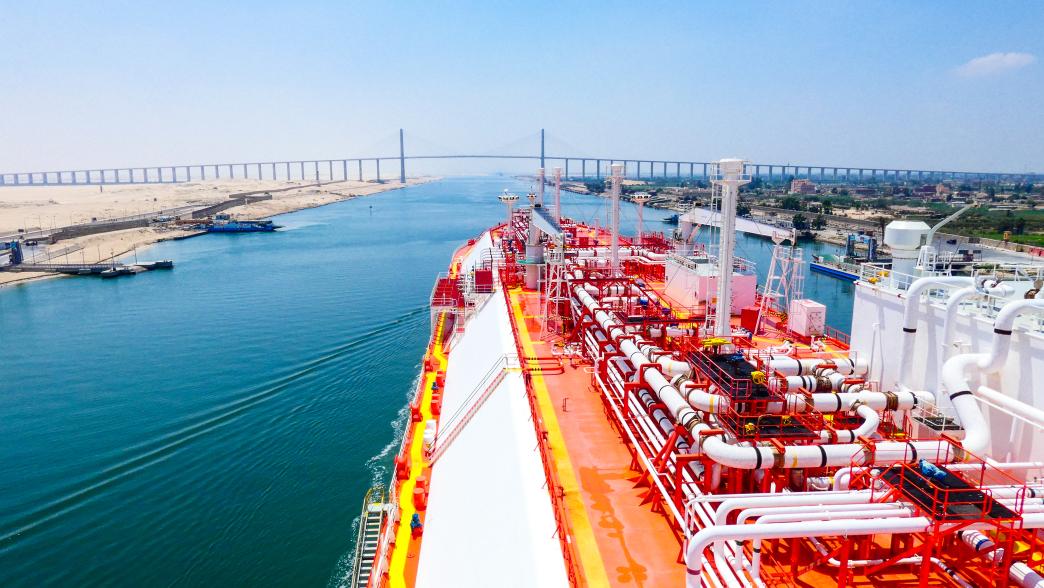
What to Expect as the East Med Responds to Europe’s Hunger for Gas
Listen to this post · What To Expect As The East Med Responds To Europe’s Hunger For Gas
On 15 June, in Cairo, European Union commissioner for energy Kadri Simson, Egyptian energy minister Tarek El Molla and Israeli energy minister Karine Elharrar signed a memorandum of understanding (MoU) by which Israel would sell gas to Europe via Egypt’s liquified natural gas (LNG) terminals. The president of the European Commission, Ursula von der Leyen, was present at the signing ceremony, and described the trilateral agreement as an important step that will contribute to the stable delivery of natural gas to the EU from the Eastern Mediterranean region. She further tweeted that this agreement would contribute to the EU’s energy security.
Observers have anticipated the EU’s move toward the East Med since the bloc began its search for alternatives to Russian gas; this was the opportunity the East Med gas producers, and Israel and Egypt in particular, were waiting for.
The MoU took effect upon signing and it is to last for nine years—an initial three years followed by two automatic three-year renewals. The agreement does not specify any quantities that should be exported from Israel, but provides for:
- “formulating a plan for the efficient utilization of infrastructure”
- “developing a road map for attaining the requisite governmental and regulatory approvals”
- “endeavouring to encourage by the EU for European companies to invest in natural gas exploration and production in Israel and Egypt”
- “assisting in the creation of a plan to reduce emissions of natural gas”
- “exploring ways to make funds available, including by the EU to develop technologies regarding emissions reduction and natural gas decarbonization”
And so, time is of the essence. Relevant governments, state institutions and companies must act quickly if Israel is to sell gas to Europe anytime soon. The technical infrastructure is in place; pipelines already carry Israeli gas to Egypt’s LNG terminals. The institutional facility for export also exists in the form of the East Med Gas Forum, established in 2019. Therefore, the aim for Egypt and Israel is to find the buyers from the EU to start the flow of the gas. Much will depend how much gas Israel can export to Europe and whether these quantities will be significant to meet part of EU needs. This is likely why the MoU states that the EU will encourage oil companies based in Europe to invest in new projects—to increase the reserves available to the EU market for as long as it needs them.
EU officials likely see this MoU as just one additional plank in their strategy to find new sources of gas—but it is not among the most vital for the bloc’s energy needs, and that is why the wording in the MoU is focused on planning, setting roadmaps and encouraging companies to invest. In comparison, in the MoU signed between the EU and Azerbaijan on 18 July states that Azerbaijan “to deliver at least 20 billion cubic metres to the EU annually by 2027.”
From gasless backwater to export contender
The MoU carries more significance in the East Med however. Almost a decade ago, the region had no reputation as a gas producer. But then many offshore gas discoveries in Israeli, Egyptian and Cypriot waters put the region on the hydrocarbon map.
But the East Med has been host to many frictions, such as the decades-long conflict between Israel and Lebanon, as well as the tensions between Greece and Turkey, and between Greek and Turkish Cypriots. Respective domestic political crises in regional powers Egypt, Israel and Turkey also inhibited governments’ pursuit of economic opportunities.
For years analysts believed that gas produced in the region would only supply local markets. Resolution of its conflicts through regional cooperation was seen as a prerequisite to the creation of an intra-regional trade in gas.
However, the region could not solve its conflicts and so individual states unilaterally developed hydrocarbons where possible. Israel and Egypt were the most successful at this “lone wolf” approach: Egypt has been investing in policies and in discoveries with international oil companies for years and has approximately 80 trillion cubic feet (tcf) of offshore gas discoveries, while Israel has been actively seeking new investors and market opportunities for its 40 tcf of offshore gas assets. Cyprus has made discoveries but has struggled to reach final investment decisions with investors. Egypt has been consuming most of its own gas with the aim of becoming self-sufficient, selling a limited amount of LNG to European and Asian markets. Israel has consumed some of its gas and sold most of the rest to Egypt and Jordan.
But now the Russian invasion of Ukraine has opened a window of opportunity for the region to sell more of its gas to Europe, and Israel and Egypt are seizing that opportunity. The main regional producers have taken this MoU as a signal to act quickly to benefit as much as they can in the coming decade.
Egypt’s energy minister has said that his country will invest in expanding its LNG terminals if demand requires. In 2020, Egypt was the second-largest gas producer in Africa and the Egyptian government aims to increase investment in gas to generate electricity and to expand its export opportunities. Egypt has long aimed to become the energy hub of the region and it now may realize that goal by becoming the transit route for gas from Israel and elsewhere in the region. Further into the future Egypt could play a similar role in hydrogen export once the EU-Egypt Hydrogen Partnership is ready for implementation.
Israel’s meandering path
Back in December, the Israeli energy minister announced that the country would cease all gas exploration in 2022, pledging that 2022 “will be the year of renewable energy.” The minister was faced with opposition to her decision, but she resisted the backlash until May, when she announced that the ministry was preparing a fourth bid round for offshore gas exploration; she attributed the policy reversal to a global market changed by the war in Ukraine and Europe’s open search for new sources of gas. This change in Israel’s energy policy is the direct result of changes in Europe’s energy policy, and in this respect Israel is not alone.
The question in Israel’s case is whether investors will be interested in mere exploration there, or prefer to invest in fields with known gas reserves, such as those in Cyprus identified by Total, Eni and ExxonMobil. The MoU clearly states that the EU will encourage European companies to bid for and invest in Israeli and Egyptian gas fields, but it also includes a provision that “any natural gas to be shipped to the European Union will originate either from the Arab Republic of Egypt, the State of Israel, or any other source in the East Mediterranean region, including EU Member States in the region”—i.e., Cyprus. This might encourage Total and Eni, holders of licenses in Cyprus, to develop the existing gas discoveries in Cypriot waters.
Looking forward
Responding quickly is important for prospective suppliers to Europe if they are to profit from its straitened circumstances. The EU is in a state of energy emergency and seeking solutions to a real-time crisis.
The coming weeks and months will reveal how this MoU will materialize into new gas contracts and into new investment decisions by the international oil companies working in the region. For now, there are three points that key players must keep in mind:
- Authorities in the East Med should remember that this window of opportunity could be short; they should manage their (and their citizens’) expectations of any significant prosperity deriving from the situation. But at the same time, stay focused on domestic needs for gas for electricity and desalination projects.
- Leaders in the region should use the opportunity to increase collaboration and enforce already existing structures such as the East Med Gas Forum to optimize existing resources and to develop not only gas projects but projects related to clean energy and renewables.
- The war in Ukraine and the EU’s quest for new suppliers could be an incentive for authorities in the East Med to resolve conflicts and disagreements. For example, Lebanon has expedited a maritime border deal with Israel after 12 years of dispute so as to unlock opportunities and incentivize companies to explore for gas in its waters. Could the potential for benefit from gas exploitation bring Greek and Turkish Cypriots toward resolution of their longstanding conflict?
The EU-Israel-Egypt MoU should ultimately be about more than gas. It can pave the way for more collaboration and partnership between the EU and the East Med countries, outlasting the state of emergency and beyond fossil fuel dependency to strengthen electricity connections, especially from green sources. It is both a short-term solution and hopefully a sign of cooperation into the energy transition.
Laury Haytayan is the Middle East and North Africa director of the Natural Resource Governance Institute.
Top photo by Alvaro Ardisana for Shutterstock
Authors

Laury Haytayan
Middle East and North Africa Director
